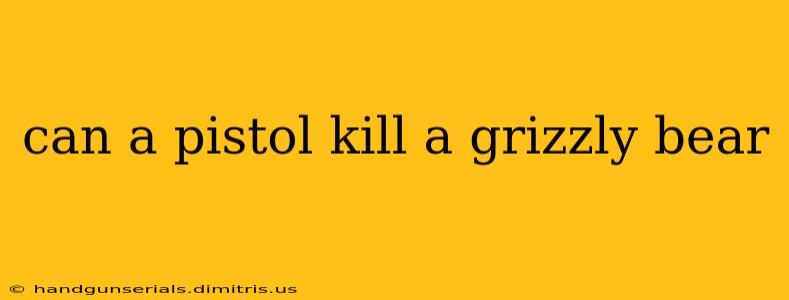The question of whether a pistol can kill a grizzly bear is a serious one, demanding a nuanced answer that goes beyond a simple "yes" or "no." While it's possible to kill a grizzly bear with a pistol under extremely specific circumstances, relying on a handgun for defense against such a formidable predator is highly discouraged and statistically improbable. This article will delve into the factors that determine the success (or failure) of such an encounter, exploring the limitations of pistols and emphasizing safer alternatives for encountering grizzly bears.
The Challenges of Using a Pistol Against a Grizzly Bear
Grizzly bears are apex predators possessing immense strength, size, and a thick layer of fat and muscle. Their thick hides offer significant protection against smaller caliber rounds. Successfully killing a grizzly with a pistol requires several critical factors aligning perfectly:
1. Caliber and Ammunition:
- Insufficient Stopping Power: Many commonly carried pistol calibers lack the stopping power necessary to quickly incapacitate a grizzly. While a well-placed shot to a vital organ could be lethal, the margin for error is drastically smaller compared to larger calibers found in rifles. A grizzly bear's immense size and resilience mean that even a hit may not immediately stop its aggressive behavior.
- Penetration: The bullet needs to penetrate the bear's thick hide and reach vital organs. Smaller calibers may lack the necessary penetration, resulting in superficial wounds that only enrage the animal. Expanding ammunition (hollow points) can increase the stopping power, but their performance in thick hides is still debatable.
2. Shot Placement:
- Precise Aim Under Pressure: Successfully killing a charging grizzly with a handgun requires incredibly precise shot placement under immense pressure. Fear and adrenaline can severely impact accuracy, making even the most skilled shooter vulnerable.
- Vital Organs: Even with a powerful handgun, a shot that doesn't hit a vital organ (brain, heart, lungs) will likely not immediately stop a charging grizzly. The animal might continue its attack, leading to potentially fatal consequences for the defender.
3. Multiple Shots:
- Rapid Follow-up Shots: Often, a single shot won't be enough to deter or kill a grizzly. The ability to quickly and accurately deliver multiple follow-up shots is crucial, but this requires significant training and experience under extreme pressure. A pistol's smaller magazine capacity further exacerbates this challenge.
Safer Alternatives and Bear Safety Practices
While a pistol might work in an extremely unlikely scenario, relying on it for self-defense against a grizzly bear is extremely risky. Far safer and more effective strategies include:
- Carrying Bear Spray: Bear spray is significantly more effective than a pistol in deterring grizzly bears. It’s lightweight, easy to carry, and requires less precise aim.
- Traveling in Groups: Grizzlies are less likely to attack groups of people.
- Making Noise: Talking loudly, singing, and making other noises can help avoid surprising a bear.
- Carrying a Rifle or Shotgun: A rifle or shotgun with appropriate ammunition offers a much higher likelihood of successfully stopping a grizzly bear attack.
Conclusion
While theoretically possible, killing a grizzly bear with a pistol is exceptionally challenging and risky. The limitations of handgun calibers, the need for precise shot placement under extreme pressure, and the bear's remarkable resilience all significantly decrease the chances of survival. Focusing on preventative measures and carrying bear spray or a larger caliber firearm represents a far more responsible and effective approach to bear safety. Prioritize your safety and rely on proven methods for deterring or defending against these powerful animals. Always consult with wildlife experts and relevant authorities for specific guidance on bear safety in your area.

